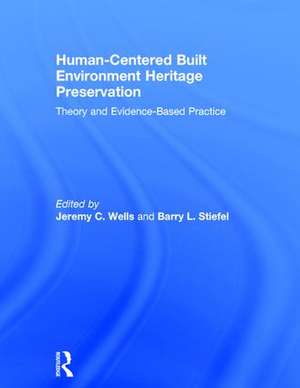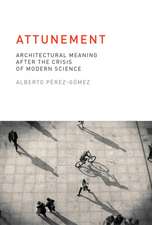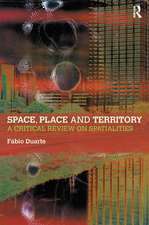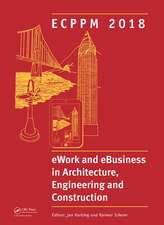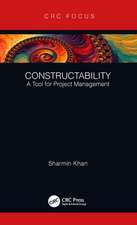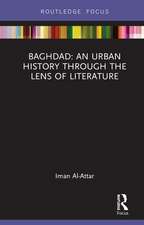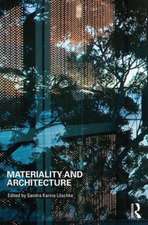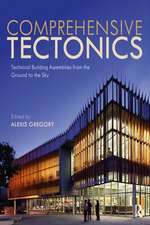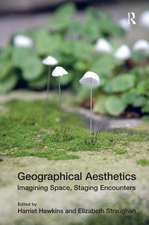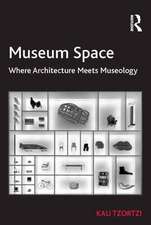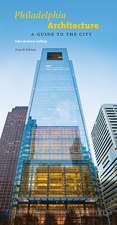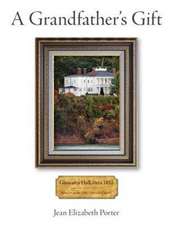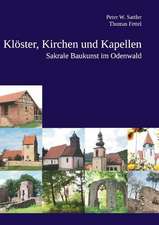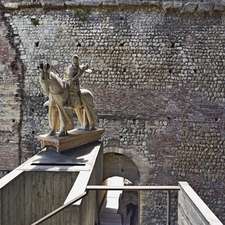Human-Centered Built Environment Heritage Preservation: Theory and Evidence-Based Practice
Editat de Jeremy C. Wells, Barry L. Stiefelen Limba Engleză Hardback – 20 sep 2018
In exploring the nature of a human-centred heritage conservation practice, we explicitly seek a middle ground between the academy and practice, theory and application, fabric and meanings, conventional and civil experts, and orthodox and heterodox ideas behind practice and research. We do this by positioning this book in a transdisciplinary space between these dichotomies as a way to give voice (and respect) to multiple perspectives without losing sight of our goal that heritage conservation practice should, fundamentally, benefit all people. We believe that this approach is essential for creating an emancipated built heritage conservation practice that must successfully engage very different ontological and epistemological perspectives.
| Toate formatele și edițiile | Preț | Express |
|---|---|---|
| Paperback (1) | 427.98 lei 6-8 săpt. | |
| Taylor & Francis – 20 sep 2018 | 427.98 lei 6-8 săpt. | |
| Hardback (1) | 1000.27 lei 6-8 săpt. | |
| Taylor & Francis – 20 sep 2018 | 1000.27 lei 6-8 săpt. |
Preț: 1000.27 lei
Preț vechi: 1219.84 lei
-18% Nou
Puncte Express: 1500
Preț estimativ în valută:
191.42€ • 207.86$ • 160.80£
191.42€ • 207.86$ • 160.80£
Carte tipărită la comandă
Livrare economică 22 aprilie-06 mai
Preluare comenzi: 021 569.72.76
Specificații
ISBN-13: 9781138583948
ISBN-10: 1138583944
Pagini: 370
Ilustrații: 4 Line drawings, black and white; 33 Halftones, black and white; 13 Tables, black and white
Dimensiuni: 189 x 246 x 22 mm
Greutate: 0.45 kg
Ediția:1
Editura: Taylor & Francis
Colecția Routledge
Locul publicării:Oxford, United Kingdom
ISBN-10: 1138583944
Pagini: 370
Ilustrații: 4 Line drawings, black and white; 33 Halftones, black and white; 13 Tables, black and white
Dimensiuni: 189 x 246 x 22 mm
Greutate: 0.45 kg
Ediția:1
Editura: Taylor & Francis
Colecția Routledge
Locul publicării:Oxford, United Kingdom
Public țintă
Professional Practice & DevelopmentCuprins
Dedication; Acknowledgements; Foreword by Tom Mayes; Preface; Introduction: Moving Past Conflicts to Foster an Evidence-based, Human-Centric Built Heritage Conservation Practice, Jeremy C. Wells and Barry L. Stiefel; Part 1: Defining a Human-Centric Built Heritage Conservation Practice; Chapter 1: Bridging the Gap between Built Heritage Conservation Practice and Critical Heritage Studies, Jeremy C. Wells; Chapter 2: The Measurement of Meaning—Psychometrics and Sense of Place, Suzanne Elizabeth Bott; Chapter 3: Meeting the Shadow: Resource Management and the McDonaldization of Heritage Stewardship, Richard M. Hutchings; Chapter 4: The Mystery of History and Place: Radical Preservation Revisited, Jack D. Elliott, Jr.; Part 2: Ways to Gather Evidence; Chapter 5: The Perception and Preservation of Vernacular Architectural Features in an Urban Historic District with Heritage Value: A Case Study from Grand Rapids, Michigan, You Kyong Ahn; Chapter 6: Image for the Future of the Historic City: Photo-Elicitation and Architectural Preservation in Barcelona, AnnaMarie Bliss; Chapter 7: Conservation and the People’s Views: Ethnographic Perspectives from Jones Beach State Park, Dana H. Taplin, Suzanne Scheld, and Setha Low; Part 3: Using Evidence to Change Practice; Chapter 8: Tours of Critical Geography and Public Deliberation: Applied Social Sciences as Guide, Jennifer Minner; Chapter 9: Of Policy Lags and "Upgraded" Neighborhoods: Historic Preservation for the Twenty-First Century, Ted Grevstad-Nordbrock; Chapter 10: Urban Preservation: A Community and Economic Development Perspective, Stephanie Ryberg-Webster; Chapter 11: Using Evidence from the Community to Guide a Local Municipality’s Preservation Program, Kimberli Fitzgerald; Chapter 12: Democratizing Conservation: Challenges to Changing the Paradigm of Cultural Heritage Management, Richard A. Engelhardt, Heather A. Peters, and Montira Horayangura Unakul; Chapter 13: Missed Opportunities: The Absence of Ethnography in America’s Cultural Heritage Programs, Richard Vidutis; Part 4: The Role of Higher Education in Leading Evidence-based Practice; Chapter 14: "But Where Are the People?" Grappling with Teaching New Approaches to Our Relationship with Place and the Past, Michelle Jolly, Melinda Milligan, Margaret Purser, and Laura Alice Watt; Chapter 15: "The Places My Granddad Built": Using Popular Interest in Genealogy as a Pedagogical Segue for Historic Preservation, Barry L. Stiefel; Chapter 16: Resistance To Research: Diagnosis and Treatment of a Disciplinary Ailment, Ned Kaufman; Conclusion: A Human-Centered Way Forward, Jeremy C. Wells and Barry L. Stiefel; Appendix A: The Palmer House Charter: Principles for Integrating Environmental Design and Behavior Research into Built Heritage Conservation Practice; Biographies of Editors and Contributing Authors; Index
Notă biografică
Barry L. Stiefel is an associate professor at the College of Charleston’s Historic Preservation and Community Planning Program. Stiefel’s research interests are in how the sum of local preservation efforts affects regional, national, and multi-national policies within the field of cultural resource management and heritage conservation. He has authored and/or edited numerous articles and books, including Community-Built: Art, Construction, Preservation, and Place (co-edited with Katherine Melcher and Kristin Faurest, 2017); and Sustainable Heritage: Merging Environmental Conservation and Historic Preservation (co-authored with Amalia Leifeste, 2018).
Jeremy C. Wells is an assistant professor in the Historic Preservation Program at the University of Maryland, College Park and a Fulbright scholar. His research explores ways to make built heritage conservation practice more responsive to people through the use of applied social science research methods from environmental psychology, humanistic geography, anthropology, and community development/public health. Wells is a member of the Environmental Design Research Association's (EDRA's) board and chair elect. At EDRA, he created the Historic Environment Knowledge Network to engage academics and practitioners in addressing the person/place and environment/behavior aspects of heritage conservation. Wells runs the heritagestudies.org website that explores how to evolve heritage conservation practice using critical heritage studies theory to better balance meanings and power between experts and most stakeholders.
Jeremy C. Wells is an assistant professor in the Historic Preservation Program at the University of Maryland, College Park and a Fulbright scholar. His research explores ways to make built heritage conservation practice more responsive to people through the use of applied social science research methods from environmental psychology, humanistic geography, anthropology, and community development/public health. Wells is a member of the Environmental Design Research Association's (EDRA's) board and chair elect. At EDRA, he created the Historic Environment Knowledge Network to engage academics and practitioners in addressing the person/place and environment/behavior aspects of heritage conservation. Wells runs the heritagestudies.org website that explores how to evolve heritage conservation practice using critical heritage studies theory to better balance meanings and power between experts and most stakeholders.
Recenzii
This edited collection argues for much-needed paradigm shift in heritage conservation theory and practice from its conventional, expert-driven approach to a people-centered methodology. This derives evidence on how ordinary communities perceive, participate in and relate to their historic environments, which could then lead to a more nuanced and holistic way for safeguarding cultural heritage. A must-read!
Dr. Kapila D. Silva, University of Kansas, USA.
In this timely and provocative collection of essays, leading heritage conservation scholars and practitioners work to bridge the divide between theory and practice and invite an important conversation on how to fashion a more empirical, evidence-based, pluralistic, and people-centered approach to preservation.
Wells and Stiefel have brought together an essential meeting of the minds and pointed the way forward to a more dynamic 21st century preservation movement informed by academic research and infused with grassroots energy.
Stephanie Meeks, President, National Trust for Historic Preservation
This book makes an important contribution to the broadening of conventional heritage studies beyond an academic and professional focus on top-down doctrine, policies and legal instruments to embrace the contemporary meanings and values that citizens attribute to their physical places and social spaces. Emphasising the importance of trans-disciplinary, evidence-based research, and conceptualising innovative, holistic approaches, the book anticipates the development of grass-roots-driven observances that would transform heritage preservation from an elitist enthusiasm backed by instruments of enforcement, into democratisation and common-ownership of preservation objectives and everyday practices.
Dennis Rodwell, Architect-Planner, Consultant in Cultural Heritage and Sustainable Urban Development
Dr. Kapila D. Silva, University of Kansas, USA.
In this timely and provocative collection of essays, leading heritage conservation scholars and practitioners work to bridge the divide between theory and practice and invite an important conversation on how to fashion a more empirical, evidence-based, pluralistic, and people-centered approach to preservation.
Wells and Stiefel have brought together an essential meeting of the minds and pointed the way forward to a more dynamic 21st century preservation movement informed by academic research and infused with grassroots energy.
Stephanie Meeks, President, National Trust for Historic Preservation
This book makes an important contribution to the broadening of conventional heritage studies beyond an academic and professional focus on top-down doctrine, policies and legal instruments to embrace the contemporary meanings and values that citizens attribute to their physical places and social spaces. Emphasising the importance of trans-disciplinary, evidence-based research, and conceptualising innovative, holistic approaches, the book anticipates the development of grass-roots-driven observances that would transform heritage preservation from an elitist enthusiasm backed by instruments of enforcement, into democratisation and common-ownership of preservation objectives and everyday practices.
Dennis Rodwell, Architect-Planner, Consultant in Cultural Heritage and Sustainable Urban Development
Descriere
Human-Centered Built Environment Heritage Preservation addresses the question of how a human-centered conservation approach can and should change practice.
